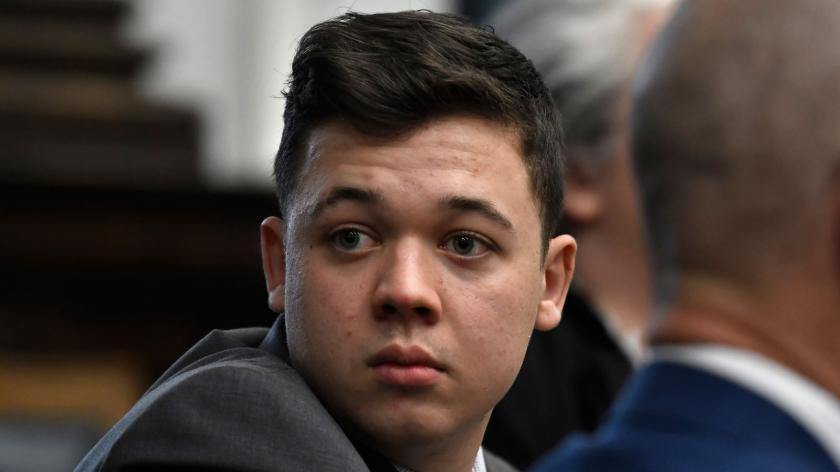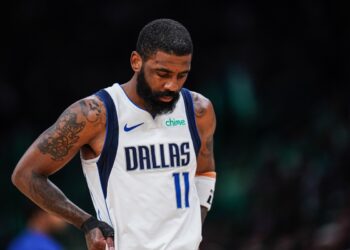By: Zachary Draves
“I’m disgusted, but not surprised” was the sentiment expressed by those who are rightfully angered at the not guilty verdict rendered in the Kyle Rittenhouse trial in Kenosha, Wisconsin.
It was clear from the beginning that this entire case was designed to give the 18-year-old vigilante the benefit of the doubt to such an extent that the judge almost became a surrogate father figure as opposed to an imperial authority of the law.
That frustration and dismay at this trial and its outcome has touched a nerve with those concerned about real justice, and that has included many in the sports world.
One of the major takeaways from this case, as athletes have pointed out, is the two systems of justice that continue to permeate and create major distrust, as laid out by NASCAR driver Bubba Wallace.
Ha, let the boy be black and it would’ve been life…hell he would’ve had his life taken before the bullshit trial.. sad
— Bubba Wallace (@BubbaWallace) November 19, 2021
But another takeaway that isn’t really being talked about should also serve as a teachable moment.
The point I am about to make is controversial, but so what?
I feel it needs to be said.
Part of the reckoning that needs to exist in society about race and particularly in sports given its broad reach and influence is a reexamination of the relationship between certain white fans and black athletes.
To be clear, I am emphasizing the word certain because I know that not all white fans feel this way.
But I am talking about this niche group of fans, the ones who support the Kyle Rittenhouses of the world, that are the most rabid of sports fans who live and breathe sports and who claim to love and admire the talent of black athletes, but once they get off the field or court, that love and admiration stops at the water’s edge.
In other words, they love black athleticism and talent but not black people.
This is not a new phenomenon as white Americans have always took pleasure in seeing black performance and entertainment since the days of slavery, but there is a huge difference between supporting black artistic genius and supporting one’s citizenship and political participation.
How in the world can you reconcile being a supporter of Kyle Rittenhouse and his kind and then turn around and wear the jersey of, say Kevin Durant or Russell Westbrook?
There is something painfully odd about that.
I know that athletes are generally encouraged to appeal to the widest audience possible, and black athletic paradigms such as Michael Jordan and Tiger Woods are often held up as prime examples of that aspiration, but there does need to be some line drawn in the sand, especially when these certain white fans detest any discussion about race and most likely don’t anything to address racism.
They can only bring themselves to say “All Lives Matter” as a condensing cop-out.
They are probably storming school board meetings throwing a temper tantrum about the teaching of some theory they know nothing about or heard of that isn’t even being taught in schools.
They are political leaders that want to relish in the spectacle of black athletic excellence by engaging in pathetic photo ops at games but are actively working to suppress the right to vote and blocking legislation to reform policing in communities where that black genius was born out of.
The truth is they shouldn’t be classified as fans but rather powerful participants in the complacency of ignorance about race.
I feel that this moment and other recent events should give black athletes and their white allies more urgency to stand in solidarity with each other and to make it clear who gets to be a fan and who should stay away.
Look at Black Lives Matter completely distancing themselves from Kyle Rittenhouse himself when he said on Tucker Carlson that he “supported” the movement.
Alexa play: I don't fuck with you https://t.co/B05DUcdxMO https://t.co/lpTUGOWj1g pic.twitter.com/Dt4jcCs5K7
— Black Lives Matter (@Blklivesmatter) November 22, 2021
They made it clear on Twitter that they want nothing to do with him because he embodies everything they have been advocating against for the past eight years when the movement was founded.
Another example is Bradley Beal of the Washington Wizards making it known that he didn’t want to have any association with Texas Senator Ted Cruz after he “expressed” support for Beal when he acknowledged his hesitancy to get the COVID vaccine.
Beal also took to the Washington Post to make it very clear about where he stood and who he wanted to stand with:
“Don’t attach me to that. Because that’s not what I was trying to do. I’m not sitting here advocating for people not to get it. … I’ve never met you, I don’t talk to you, and I don’t support you or anything you do. That’s a little weird. That’s why I don’t like social media. Ted, you know damn well I ain’t rockin’ with you. You’re not going to get no cool points if that’s what you’re in it for.”
This should give black athletes more reason to draw that line in the sand, and given the circumstances of this past year, who can blame them?
This year alone, we have seen the public humiliation and dehumanization of black athletes in the form of popcorn being thrown at Russell Westbrook, Trae Young getting spat on, and Kyrie Irving almost getting hit with a water bottle.
I don’t find it ironic that these players that were targeted are the most outspoken when it comes to race and social justice.
I also wouldn’t be shocked to find out that these fans that did these things are probably huge supporters of Rittenhouse.
When Simone Biles decided to pull herself out of the Tokyo Olympics to prioritize her mental well-being, this same group targeted her as “unpatriotic,” “weak,” or even as a “sociopath” when just five years ago they were on their high horses praising her talent.
Naomi Osaka doesn’t speak to media during the French Open, citing her mental well-being, and they chastised her with the same personal assaults when just a short while ago they were probably cheering her.
Again, I won’t be surprised if these haters show their love for Rittenhouse.
It goes to show that love and admiration of black athletes is only temporary and purely conditional, and this recent trial, along with other modern-day flashpoints, should serve as a reminder of that.
Athletes have to continue to take control of their narrative and risk losing fans that didn’t care about them, to begin with, because it will serve a greater purpose.
That greater purpose is justice, dignity, and respect, something the Kyle Rittenhouses of the world know nothing about.


 NFL
NFL





